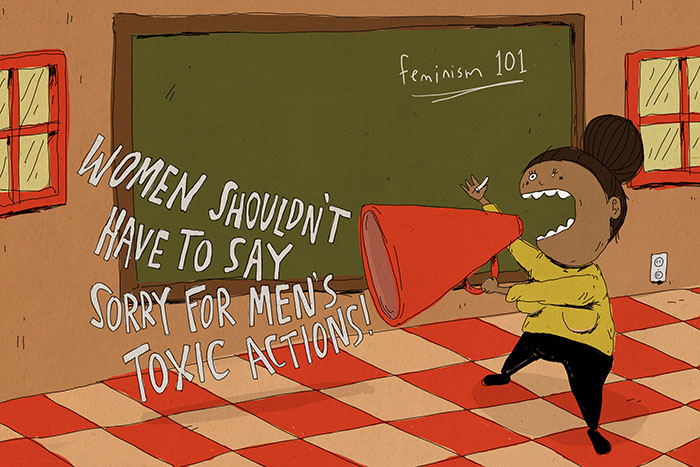I went out to get groceries the other day wearing bagging sweats, an ill-fitting t-shirt, and hair thrown up in a bun that looked like it had survived a hurricane. Equipped with my backpack and headphones placed over my ears, I went about my errand looking forward to going home and making dinner for myself. Upon leaving the store, I was holding three bags and dreading the fifteen minute uphill walk back to my apartment.
With my music turned up, I began my walk home, thoughts drifting away before I was abruptly stopped by a man on the other end of the crosswalk. He was obviously talking to me, his lips moving in my direction. I struggled to pull off my headphones before quietly speaking, “I’m sorry, what did you say?”
He began to tell me that I was cute and that he wanted to take me out right that second to coffee. Now sweating from holding my bags in the hot sun I politely declined, saying that I had to get home. He refused to let me leave and blocked my path around him, demanding I give him my attention. He then spends the next few minutes asking me vague questions about myself, trying to convince me to stay with him while my bags begin slipping out of my hands. I am frustrated. In a desperate attempt to get him to leave me alone, I offer up my phone number. He refuses, claiming that I am just trying to get away from him. Eventually, I just push past him and continue walking even though he follows me. Still asking me about myself, he somehow manages to insult my studies, my work, and ask if my roommates vagina is tight.
After all this you’d think I’d tell him to go to hell, but instead I did the worst possible thing — apologize.
I apologized. I told him I was sorry that I didn’t want to go out and that I was sorry for being busy. I was sorry that he walked me all the way home even though the whole time my heart was beating from fear. I was sorry for everything.
Once I got back to my apartment, I sat in the kitchen and thought about what had just happened. How I had asked to be left alone. How he hadn’t let me walk farther than an arms length away from him. How he had hugged me when I scrambled to get away from him. Yet here I was, apologizing for my own harassment. Why? Because that is what women do. We are sorry for taking up the air that we breathe.
It is no secret that women have been oppressed under the ruling of men for as long as modern civilization has existed. It hasn’t even been 100 years since women got the right to vote, and even today women only get .80 cents to every dollar a man makes. It is no wonder that even though the world is changing and feminism is as alive as it’s ever been, the long standing socialization of women to stand second to men lingers on. A recent nation wide survey found that 6 in 10 women identify as a feminist, as well as a third of men. Even with these statistics approaching the majority, some still view the movement as one based in anger, having a tendency to blame men for all of women’s problems. There is still a very strong disconnect between men and women on what feminism and equality mean.
As a sociology major, I spend my time studying the behaviors of society and the interactions that make up our everyday lives. Even with the education to analyze my surroundings through this lens, I still walked away from a man that made me feel afraid by giving him a smile.
Most women have similar stories to tell. To make a clear distinction, this is not about how all men are disrespectful, or even men themselves, but of the nature of our culture. Even in the presence of feminism and educated activists working towards an equal society, it can sometimes become the same battle that has raged on for years: Men vs women. In reality we stand on different sides of the same coin, constantly in contrast, but definitely not one without the other. In a situation like this we cannot expect the other to understand without first exhibiting change in a society that has neglected to recognize its faults.
How do we reverse something that is part of the foundation of the culture we have built our lives upon? I often wonder if it will ever be possible to be completely equal to men, and though definitely not within my lifetime, I do believe in the future of this cause. Much as the Civil Rights Act of 1964 outlawed discrimination based on things like race and sex, we may hopefully see more protections while we’re still here.
Sexism and racism are very different levels of oppression and I am in no shape trying to compare the two as equal. The discussion of human rights, moral values, and how the distribution of power affects our lives is a conversation worth having.
Patricia Hill Collins is one of the most recognized Black female sociologists. She created a paradigm known as the Matrix of Domination that looks at how race, class, and gender are all interconnected. This theory was initially used to study Black women but has been applied much more expansively. This theory looks at the intersection of a person’s race, gender, and class as a whole instead of separating these individuals into different groups.
How does this relate to being asked out on the sidewalk? On a micro level, it doesn’t. But from a zoomed out perspective, the immensity of the macro level connections of these problems to one another is astounding. In fact, every interaction we have is simply another link in a never ending chain, one ring in an infinite ripple, for this is how society perpetuates itself. When looking at the Matrix of Domination as a theory of trying to understand the complexities of a society’s cultural norms, being asked out and harrassed on your way home from work doesn’t seem random at all, but almost a predictable expectation.
If this is the case, how can we break a cycle of norms and predictable behavior of not just one group, but of an entire society? We can’t. Well, not all at once, anyway. The only way to create change is to start having those difficult conversations about women’s rights, about female oppression, racist oppression, economic oppression. Ignoring or refusing to acknowledge the discrimination in a society is often the result of a lack of awareness, and though it is not always one’s fault if they aren’t exposed to information, that’s where the rest of us come in.
It can take decades to change society’s mind on a topic, and sometimes an entire lifetime to get laws passed, but it only takes a moment to engage with another person. Just one moment to take the time to talk to one another, challenge our beliefs, open our minds. The human brain is not one without the ability to evolve, but rather sometimes full of long-held assumptions that become somewhat of a truth. Truth itself, being the one constant we cling to as human beings, makes it difficult to object to, yet this is what guides us. Our truth of the world, our beliefs and values, our self-perception in relation to others, our inner compass and intuition. We rely on these feelings everyday to tell us how to react and how to communicate.
So, next time you find yourself in my shoes, or any pair of shoes, when a situation unravels, be present. Be aware, have those difficult conversations, educate one another. If asked out by a man who refuses to take no for an answer, tell him why he is wrong. Ask him what he thinks and then object. At the end of the day we are all human and we are all equal in the purest sense of the word. It is up to every single one of us to make a difference and to take accountability for the world we live in. It may be scary, but the only thing stronger than fear is hope, and it is that longing for a better life that drives us above all.
Illustration by Syd Dolzine





